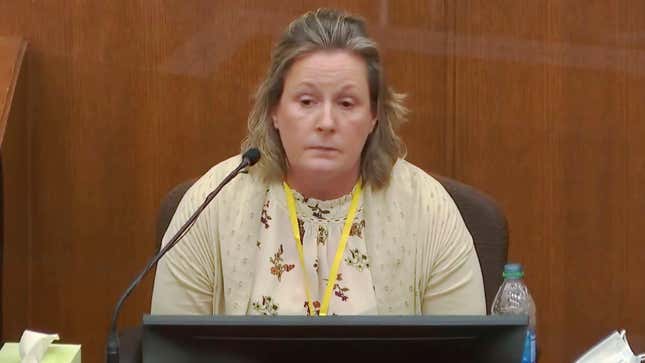
The mostly white jury in the trial for former Minnesota officer Kim Potter have not come to a verdict after nearly a week and a half of testimony and evidence. At the end of over nine hours of deliberations on Tuesday, the jury asked the court what would happen if they could not reach a consensus.
“If the jury cannot reach consensus, what is the guidance around how long and what steps should be taken?” jurors wrote in a note, according to CNN. They have been deliberating since Monday following closing arguments from both the defense and prosecution.
Hennepin County Judge Regina Chu advised the jury to continue deliberating until they can reach a verdict, ABC News reports. The jury continued for another hour and half before stopping to resume on Wednesday.
From ABC:
The judge then reread from the jury instructions, telling the jurors to continue to “discuss the case with one another and deliberate with a view toward reaching agreement if you can do so without violating your individual judgment.”
Potter’s attorneys objected to the judge rereading that instruction, arguing that doing so inappropriately emphasized that paragraph over the rest of the instructions. Chu overruled.
Rachel Moran, a professor at the University of St. Thomas School of Law, noted that the jurors didn’t say they were at an impasse.
“Judge (Regina) Chu is going to let them keep deliberating if they don’t express concern or distress about how it’s going,” Moran said.
The judge has ordered that the jury be sequestered during deliberations — meaning they remain under the court’s supervision in an undisclosed hotel and cannot return home until they have reached a verdict or the judge has determined they can’t reach one. Her order allows them to communicate with family members as long as they avoid discussing the trial.
Potter is charged with first and second- degree manslaughter in the fatal shooting of Black 20-year-old Daunte Wright on April 11 in Brooklyn Center, Minnesota, just miles away from where former Minneapolis officer Derek Chauvin stood trial for the death of George Floyd.
Potter, who tearfully testified in her own defense, claims that she meant to use her taser when she shot and killed Wright.
“I was very distraught. I just shot somebody. I’m sorry it happened,” Potter said, according to CNN. “I’m so sorry.”
During the trial, prosecutors pointed out not only the major differences between the two weapons, but also argued that the 26 year police veteran was not within her right to use deadly force. Defense attorneys asserted that Wright caused his own death by attempting to flee arrest and that even though Potter made a deadly mistake, she was right to protect a fellow officer who was leaning into the car that Wright was in.
In another note to the court, the jurors asked the judge if they could hold Potter’s handgun during deliberations, ABC reports. Judge Chu overruled an objection from the defense and will allow the jurors to use it. The gun was zip tied, unloaded, in an evidence box.

